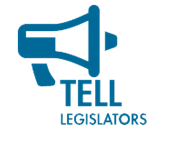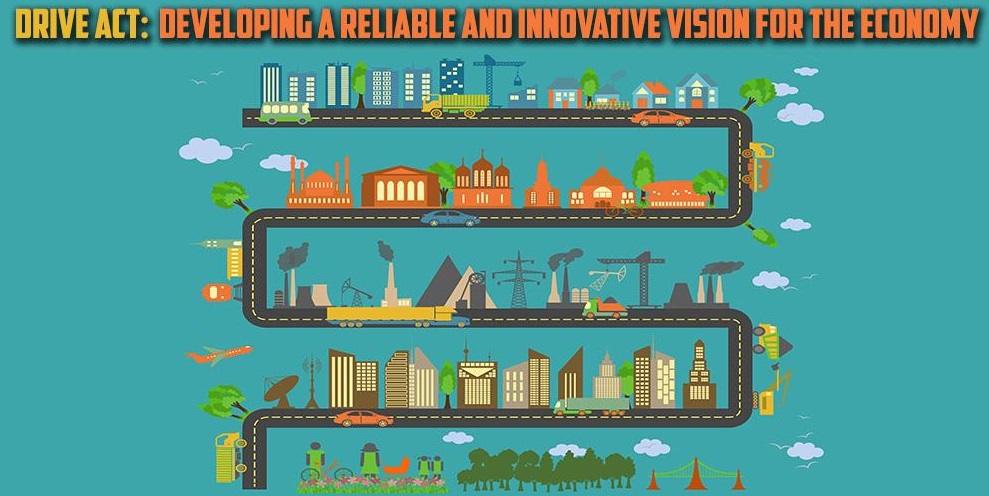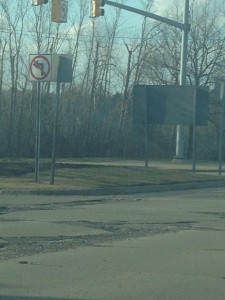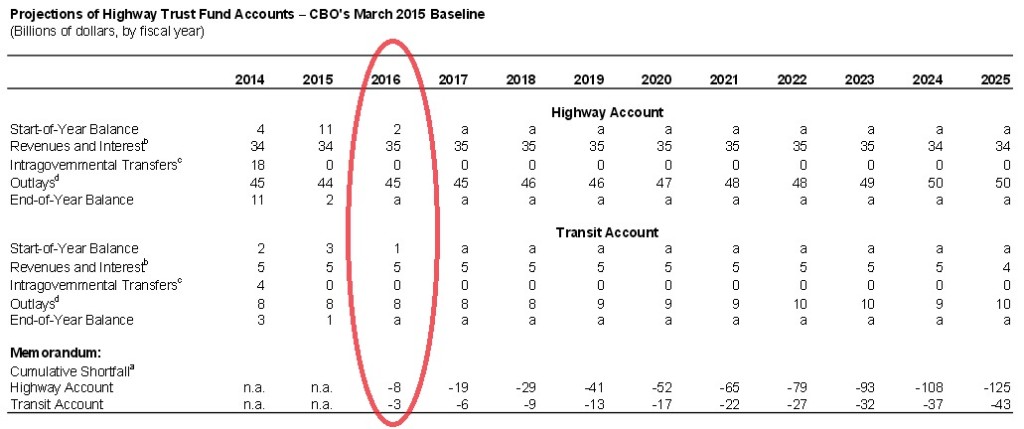Five (More) Myths About the Highway Trust Fund
July 15th, 2015 | By: Becky Moylan
1. Devolving the federal program to the states is a viable option Devolution is the idea of eliminating the federal government’s ability to collect the current 18.4 cents per gallon in federal gasoline taxes (absent a few cents to remain dedicated toward maintaining the Interstate Highway System) and transferring all authority over these programs to the state. This act would represent one of the single greatest unfunded mandates at nearly $50 billion—a violation of the Unfunded Mandates Reform Act of 1995. The current system empowers states by making the federal role a reimbursement process, allowing states to make their own planning and building decisions while also having some overall coordination and safety standards among states. Many states have raised their own gas taxes recently, essentially catching up the purchasing power of their current gas tax rates with inflation since they were last adjusted. For example, Iowa had not raised its gas tax since 1989 and its 10-cent increase was a hard fought battle. To ask states to pick up the tab for the federal role—which on average is 52% of the state’s capital budget each year—would be a huge burden to states’ budgets. On average, states would need to raise their gas tax by 23 cents or significantly cut their transportation program. It would not be the easy task that the proponents of devolution make it out to be. Instead, our roads, bridges and transit would continue to deteriorate and the backlog of projects would grow longer and the system will become patchwork if some states fail to make investments. 2. Transportation has become a partisan issue Transportation has historically been a bipartisan issue, and passing a multi-year, properly funded transportation bill will only be accomplished through bipartisan cooperation. In the past year, there have been several bipartisan proposals to help address the Highway Trust Fund crisis. Senators Bob Corker (R-TN) and Tom Carper (D-DE) have proposed a plan. In the House, Reps. Renacci (R-OH), Pascrell (D-NJ), Ribble (R-WI), and Lipinski (D-IL) have introduced the Bridge to Sustainable Infrastructure Act. Before the Independence Day Recess, the Senate Committee on Environment & Public Works unanimously passed the DRIVE Act out of committee. Both sides of the aisle acknowledge that our transportation system is ailing and that something must be done. Fixing the Highway Trust Fund is, at its heart, a bipartisan endeavor. 3. Flat funding is fine If Congress does not grow the program and increase federal funding levels in the next multiyear transportation bill, then our economy will continue to suffer. In 2011, ASCE released an economic study on transportation titled Failure to Act, which details how underinvesting in transportation is a drag on our economy. The study outlined what the economic ramifications will be by 2020 if status quo funding levels continue. Among them, we revealed that America’s GDP will underperform by $897 billion in total by 2020 and each family’s budget loses $1,060 each year in disposable income—money every American household has already lost and will continue to lose if we don’t improve our transportation network. Underinvestment in transportation will cost our economy 877,000 jobs in the year 2020. Continuing to fund at current levels for the next several years will neither improve our aging transportation network, nor grow the economy 4. A gas tax is not politically possible Several states have recently acted in bipartisan fashion to pass gas tax increases. In those states, 90% of those who voted in favor the gas tax increase got reelected in the following election. And many were conservative states, like Arkansas, which needed to see a high return on investment. A poll by the Mineta Transportation Institute demonstrated that people are willing to pay more in gas taxes if it goes to improving transportation. This study shows that voters recognize the connection between potholed roads and aging bridges and underinvestment. In addition, the impact of a gas tax on gas prices is not as direct as sometimes thought. A recent study by ARTBA finds that gas tax increases have very little impact on the overall price of a gallon of gas. CBO projects that the Highway Trust fund’ revenue shortfall will be $8 billion at the end of this year and be between $85 billion and $90 billion by May 31, 2021. There is no reason to add to the national debt and our burden on future generations when raising the gas tax is a deficit-neutral options. 5. We can kick the can again Two-month stopgaps hurt the economy and American business. For two consecutive years, the summer highway and transit construction season has taken a hit because of the uncertainty surrounding the federal program. For example, just in the last few weeks and months, several states have announced they are canceling or delaying projects until Congress passes a multi-year bill. These short-term extensions not only delay existing projects in the pipeline but prevent major projects from being considered in light of the lack of a clear federal funding commitment. Ultimately the lack of certainty hinders our nation’s ability to dream big on ways to modernize our infrastructure and create the foundation for the 21st century economy. See the original posts 10 Myths About the Highway Trust Fund.Congressional Focus Remains on Highway & Transit Bill
July 13th, 2015 | By: America's Infrastructure Report Card
This week both the U.S. House of Representatives and U.S. Senate will gear-up over the future of federal highway and transit funding and policy. The House is expected to approve a six-month extension of current policy, which would cost approximately $9 billion. The Senate is expected to take-up highway legislation later this week, but it remains unclear to length and scope of legislation that they will be pursuing. Majority Leader McConnell has expressed support for a multi-year bill, possibly some form of the DRIVE Act. However, other Senators have discussed the option of extending the current policy to the end of the year with the hopes of dedicated revenues to transportation from international tax reform. The Senate Commerce, Science and Transportation Committee is set to mark-up its safety, freight and rail portions of the bill this Wednesday morning. It remains unclear when or if the Senate Banking Committee will mark-up its transit portion of the bill. Last week, Congressman Tom Rice (R-7-SC) introduced the H.R. 2971, “The Highway Trust Fund Certainty Act”, which would raise federal motor fuels taxes by approximately 10 cents per gallon and index that rate to inflation in order to address the current annual Highway Trust Fund shortfall. In a letter to the Congressman, ASCE commended Rep. Rice’s leadership on this issue, but noted that additional federal investment will still be required to meet our nation’s long-term surface transportation infrastructure needs. You can urge Congress to #FixTheTrustFund by the July 31 legislative deadline in the following ways:- Send a request today to meet with your members of Congress: Here are some helpful hints and how to set up a “back home” meeting.
- Contact your Member of Congress via letter or phone call: If you can’t meet in person, send your member of Congress a quick letter about the Highway Trust Fund or give their office a call and ask for the staff that handles transportation. Look up their number and get talking points here.
- Communicate with your member of Congress via social media: Most members of Congress have Facebook and Twitter pages. In addition to calling or writing a letter, urge them to #FixTheTrustFund on social media.
Gas Tax Gets New Attention
July 10th, 2015 | By: Olivia Wolfertz
The hour glass is running thinner on the federal surface transportation program. Congress has only three weeks left to pass a robust, multiyear surface transportation bill before the self-imposed deadline. This week ASCE joined with the American Road and Transportation Builders Association in sponsoring an ad directed at Congress and the President, asking that they continue the legacy of federal investment in transportation. One Congressman introduced legislation this week that could be an answer to that call. Republican Rep. Tom Rice’s legislation, “The Highway Trust Fund Certainty Act,” would raise the federal gas tax by 10.1 cents-per-gallon and index the rate to inflation. This rate would increase Trust Fund revenues by $17 billion—addressing the current funding shortfall and allowing slight growth to the program. In a letter to the Congressman, ASCE commended Rep. Rice’s leadership on this issue, but noted that additional federal investment will still be required to meet our nation’s long-term surface transportation infrastructure needs. Another gas tax increase proposal, the UPDATE Act, also continues to gain supporters and now has 35 co-sponsors. Meanwhile, Transportation Secretary Anthony Foxx is urging Congress to step up and pass a long-term highway funding bill. “We’ve got some problems. I would label it a crisis — a legitimate, disturbing and alarming crisis in our infrastructure system,” Foxx told a small group of reporters at the department’s headquarters Wednesday. He also warned that the administration will begin to notify states about the threat to their transportation funding if Congress doesn’t pass a long-term extension soon. States like Alabama, Massachusetts, Montana, New Hampshire, South Dakota, Missouri and more are publicly acknowledging their dire infrastructure needs and have begun to halt construction due to the uncertainty of federal funding. With three weeks left, it’s important that your Members of Congress hear from you about why they must work together to come up with a long-term funding solution before July 31 in order to #FixTheTrustFund. Write a letter, call you Senators’ and Representative’s offices, and tweet using #FixTheTrustFund to remind your representation in Washington they have a job to do and a deadline fast approaching.#FIXTHETRUSTFUND This Week: Time for Congress’ Next Move
July 6th, 2015 | By: Becky Moylan
 Congress returns to D.C. this week, and we’re watching the Senate (where the most promising legislation was recently passed through the EPW Committee) to see if the Senate Commerce Committee or the Senate Banking Committee will start to mark-up their portions of the highway and transit bill. However to truly move forward, Senate leadership and the Senate Finance Committee need to find the revenue to move the DRIVE Act forward.
With just 16 working days with both chambers in session before the July 31 deadline, it’s important that Congress hear from you. Drive Congress to #FixTheTrustFund in the following ways:
Congress returns to D.C. this week, and we’re watching the Senate (where the most promising legislation was recently passed through the EPW Committee) to see if the Senate Commerce Committee or the Senate Banking Committee will start to mark-up their portions of the highway and transit bill. However to truly move forward, Senate leadership and the Senate Finance Committee need to find the revenue to move the DRIVE Act forward.
With just 16 working days with both chambers in session before the July 31 deadline, it’s important that Congress hear from you. Drive Congress to #FixTheTrustFund in the following ways:



Holiday Travel Will Further Stress Nation’s Ailing Highways
July 2nd, 2015 | By: Olivia Wolfertz
With Independence Day around the corner, now is a good time to reflect upon the freedoms we have enjoyed for the past 239 years. To this day, our national interstate highway system represents the freedom of mobility that we enjoy as Americans. This holiday weekend, AAA is predicting that nearly 42 million Americans will travel at least 50 miles from home on the nation’s roads and highways. Given the dire condition and investment needs of our surface transportation, Congress must remember that ultimately they are responsible for maintaining and modernizing our transportation network. Despite Congress’ constitutional responsibility to fund surface transportation, our lack of federal road, bridge and transit funding means has led many states to step up transportation funding themselves. Six states have increased their gas tax starting July 1, including Idaho, Georgia, Maryland, Rhode Island, Nebraska and Vermont. Earlier this week, Washington joined other states this year in passing a transportation bill that includes a gas tax increase of 12 cents per gallon. This is reflective of the trend noted recently in Huffington Post about the many states that have enacted transportation funding this year, while another 16 are in the process of doing so. These actions will “generate billions of additional dollars” for local transit and highway projects. As motorists hit the roads this weekend, let’s hope that the traffic headaches they will certainly face will motivate Congress to come up with a funding solution to #FixTheTrustFund.Can you hold your own on our infrastructure quiz? Let’s find out!
July 1st, 2015 | By: America's Infrastructure Report Card
“Test your Infrastructure I.Q.” is a quiz to help you learn more about our nation’s infrastructure. The quiz is a fun, interactive tool and covers 16 categories of American infrastructure: energy, schools, public parks & recreation, transit, roads, rail, ports, inland waterways, bridges, aviation, wastewater, solid waste, levees, hazardous waste, drinking water and dams. If you get a question wrong, you can find the answer and maybe learn a few other facts as well. What are you waiting on? It’s time to test your infrastructure I.Q.!
Senate Committee Passes Surface Transportation Bill
June 24th, 2015 | By: America's Infrastructure Report Card
 Today, the U.S. Senate Environment and Public Works Committee (EPW) unanimously approved a six-year, $278 billion federal highway portion of the surface transportation authorization bill, the Developing a Reliable and Innovative Vision for the Economy (DRIVE) Act. The DRIVE Act was unveiled earlier this week by EPW Committee leaders Chairman James Inhofe (R-OK), Ranking Member Barbara Boxer (D-CA), Subcommittee Chairman David Vitter (R-LA) and committee member Senator Thomas Carper (D-DE).
The bill would increase funding levels for highway programs by approximately $2.5 billion per year. The responsibility to identify how to pay for that increase, along with the annual Highway Trust Fund shortfall of $15 billion, belongs to the Senate Finance Committee. Tomorrow the Finance Committee will hold a hearing on transportation financing, where in testimony to the Committee ASCE underscored the importance of public support for funding as necessary to improving future financing opportunities. While Finance is still determining how they would like to pay for the DRIVE Act, in a recent interview with ASCE, Chairman Inhofe noted that he believes that General Fund revenues plus dollars from any corporate repatriation tax changes could address the funding gap. In addition to Finance, there are a few other Senate committees that need to act before the July 31 deadline to approve their transportation policy pieces, like transit and driver safety items.
ASCE sent a support letter to Senate leaders in favor of the DRIVE Act and President Bob Stevens issued a statement where he said, “The DRIVE Act achieves many of the goals that we as civil engineers believe must be addressed in the next surface transportation reauthorization and accomplishes these goals in a bipartisan fashion.” Some of the policy items contained in the DRIVE Act that ASCE supports include:
Today, the U.S. Senate Environment and Public Works Committee (EPW) unanimously approved a six-year, $278 billion federal highway portion of the surface transportation authorization bill, the Developing a Reliable and Innovative Vision for the Economy (DRIVE) Act. The DRIVE Act was unveiled earlier this week by EPW Committee leaders Chairman James Inhofe (R-OK), Ranking Member Barbara Boxer (D-CA), Subcommittee Chairman David Vitter (R-LA) and committee member Senator Thomas Carper (D-DE).
The bill would increase funding levels for highway programs by approximately $2.5 billion per year. The responsibility to identify how to pay for that increase, along with the annual Highway Trust Fund shortfall of $15 billion, belongs to the Senate Finance Committee. Tomorrow the Finance Committee will hold a hearing on transportation financing, where in testimony to the Committee ASCE underscored the importance of public support for funding as necessary to improving future financing opportunities. While Finance is still determining how they would like to pay for the DRIVE Act, in a recent interview with ASCE, Chairman Inhofe noted that he believes that General Fund revenues plus dollars from any corporate repatriation tax changes could address the funding gap. In addition to Finance, there are a few other Senate committees that need to act before the July 31 deadline to approve their transportation policy pieces, like transit and driver safety items.
ASCE sent a support letter to Senate leaders in favor of the DRIVE Act and President Bob Stevens issued a statement where he said, “The DRIVE Act achieves many of the goals that we as civil engineers believe must be addressed in the next surface transportation reauthorization and accomplishes these goals in a bipartisan fashion.” Some of the policy items contained in the DRIVE Act that ASCE supports include:
- Increased program funding over a six-year period;
- Multi-year program certainty that will help states and localities better plan and deliver projects;
- Prioritizing funding for bridge maintenance and repair;
- A focus on Interstate Highway System maintenance;
- Establishment of a new freight program, funded at $2 billion annually, to improve goods movement;
- Establishment of a new competitive grant program for large highway projects;
- Increased accounting and reader-friendly reporting of how Highway Trust Fund dollars are spent;
- Accelerated project delivery reforms aimed to improve collaboration between agencies and create deadlines for agency action(s);
- An option for rural areas to bundle small projects such as bridges to increase efficiency;
- Encouragement of agencies on resilience planning and natural disaster risk reduction;
- Expanding tolling to be available for use on all new Interstate Highway System lane construction projects;
- Creating a new intelligent transportation systems grant to accelerate technology deployment; and
- Providing grants to states for continued and expanded pilot testing of future road user fee collection systems.
Majority of Americans Say Yes to Gas Tax Increase to Fund Transportation
April 30th, 2015 | By: Becky Moylan
In the debate on how to best fix the Highway Trust Fund, often times lawmakers shy away from the most direct funding source: a raise to the federal gas tax. Its last increase was in 1993, and since that time it has lost a third of its purchasing power. While many states have taken bipartisan action in the past few years to better fund their roads, bridges, and transit using this method, federal lawmakers have continued to be reluctant as previous research has indicated opposition to an increase. However, a new research poll shows that a majority of voters would support an increase to the gas tax, so long as it goes toward better transportation infrastructure. The study, released by the Mineta Transportation Institute, found 69 percent of respondents willing to pay a 10-cent per gallon increase for improved road maintenance. In addition to supporting an increased investment in roads and bridges, two-thirds of respondents also agreed that some gas tax revenues should go toward transit, as most people want good public transit service in their state. As Congress must act by May 31 to reauthorize the surface transportation law, this new study demonstrates that voters support finding the needed funding through an increase to the gas tax. While the 10-cent increase tested in this research would not grow our system in the future, it can act as a springboard to improve America’s roads, bridges, and transit. The bottom line: Americans want better transportation and they are willing to pay for it.Tags: bridges, gas tax, highway trust fund, public transit, roads
1 Comment »
Michigan Must Say Yes to Safer Roads
April 8th, 2015 | By: Becky Moylan
In Michigan, a common saying is “there are two seasons: winter and road construction.” Rough winters and underinvestment for the past 50 years have led the Great Lakes state to have some of the worst roads in the nation. And while construction season may seem constant during the warmer months, the truth is currently the state cannot keep up with meeting the needs to maintain or improve roads and bridges. The continual underinvestment has led to a backlog of needs and safety issues. Gov. Rick Snyder has been advocating for the past few years that something needs to be done to change the state’s trajectory. Last December, in an eleventh hour deal, the state legislature decided to punt the decision to the voters. In just under a month, the option to increase funding for roads will be considered at the polls. If passed, Proposal 1 would raise $1.2 billion a year to be invested exclusively into transportation. As I drove around my hometown last week, this seemed like a no-brainer. I’ve included a couple photos, but it does not fully do the problem justice. Many roads are in such bad shape that debris lines the shoulders of the street, rubble that is a byproduct of the potholes and gaping cracks in the pavement. The same month state lawmakers devised Prop 1, TRIP released a study revealing poor roads were costing the average Michigan driver $539 a year —and remember it’s the Motor City, people love their cars and many work for the auto industry. In some areas the extra vehicle operation costs that include accelerated vehicle depreciation, additional repairs, increased fuel consumption and tire wear costs drivers as much as $851 a year. Here is how Proposal 1 works:- Raise the state sales tax rate by one penny, from 6 percent to 7 percent
- Implement a series of laws that exempt fuel from the sales tax, then impose a higher fuel tax whose revenue would be used exclusively for transportation
- Raise vehicle registration fees to increase transportation funding
- Raises $1.2 billion each year to increase investment in transportation—bringing Michigan more in line with the transportation investment of neighboring states
- Ensure every penny raised at the gas pump goes to improving Michigan’s roads, bridges and public transit
- Protect taxpayers by getting road builders to give warranties on the roads they build
Tags: bridges, Michigan, roads, surface transportation, transit
2 Comments »
Action to Fix Highway Trust Fund Needed by This Summer
March 9th, 2015 | By: America's Infrastructure Report Card
Tags: bridges, highway trust fund, infrastructure, roads, transit, transportation
No Comments »



 */ ?>
*/ ?>















